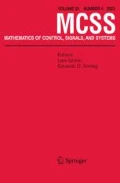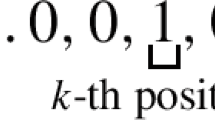Abstract
We investigate the infinite dimensional control linear systems with delays in the state and input. We give a new variation of constants formula when the state and control delay operators are unbounded. We prove the existence of mild and classical solutions of such systems. Our approach is based on the theory of abstract and regular linear systems introduced by Salamon (Math Syst Theor 21:147–164, 1989) and Weiss (Isr J Math 65:17–43, 1989). Finally, we apply our abstract framework to an example from population dynamics.
Similar content being viewed by others
References
Bátkai A, Piazzera S (2001) Semigroup and linear partial differential equtions with delay. J Math Anal Appl 264:1–20
Bensoussan A, Da Prato G, Delfour MC, Mitter SK (1992) Representation and control of infinite dimentional systems, vol. I. Birkhäuser, Boston
Curtain RF, Weiss G, Weiss M (1996) Coprime factorization for regular linear systems. Automatica 32:1519–1531
Da Prato G, Iannelli M (1993). Boundary control problems for age-dependent equations. In: Clément Ph, Lumer G (eds). Lecture notes in pure and applied mathematics vol. 155, Dekker, New York, pp 91–100
Delfour MC (1986) The linear quadratic optimal control problem with delays in state and control variables: a state space approach. SIAM J Control Optim 24:835–883
Delfour MC, Karrakchou J (1987) State space theory of linear time invariant systems with delays in state, control and observation variables, Part I. J Math Anal Appl 125:361–399
Delfour MC, Karrakchou J (1987) State space theory of linear time invariant systems with delays in state, control and observation variables, Part II. J Math Anal Appl 125:400–450
Desch W, Milota J, Schappacher W (2001) Least square control problems in nonreflexive spaces. Semigroup Forum 62:337–357
Engel K, Nagel R (2000) One-parameter semigroups for linear evolution equations. Springer, Berlin Heidelberg New York
Hadd S (2005) Unbounded perturbations of \(\mathcal{C}_0\)-semigroups in Banach spaces and applications. Semigroup Forum 70:451–465
Hale JK, Verduyn Lunel SM (1993) Introduction to functional differential equations. Springer, Berlin Heidelberg New York
Iannelli M (1994) Mathematical theory of age-structured population dynamics. Giadini Editori e Stampatori in Pisa
Ichikawa A (1982) Quadratic control of evolution equations with delays in control. SIAM J Control Optim 20:645–668
Pritchard AJ, Salamon D (1985) The linear quadratic control problem for retarded systems with delays in control and observation. IMA J Control Inform 2:335–362
Rudin W (1970) Real and complex analysis. McGraw-Hill, New York
Salamon D (1984) Control and observation of neutral systems. Pitman, Boston
Salamon D (1987) Infinite-dimentional linear system with unbounded control and observation: a functional analytic approach. Trans Am Math Soc 300:383–431
Salamon D (1989) Realization theory in Hilbert spaces. Math Syst Theor 21:147–164
Staffans OJ (2004) Well-posed linear systems. Part I. General theory. Cambridge University Press, Cambridge
Vinter RB, Kwong RH (1981) The infinite time quadratic control problem for linear systems with state and control delays: an evolution equation approach. SIAM J Control Optim 19:139–153
Webb GF (1985) Theory of nonlinear age-dependent population dynamics. Dekker, New York
Weiss G (1989) Admissible observation operators for linear semigoups. Isr J Math 65:17–43
Weiss G (1989) Admissibility of unbounded control operators. SIAM J Control Optim 27:527–545
Weiss G (1989) The representation of regular linear systems on Hilbert spaces. In: Kappel F, Kunisch K, Schappacher W (eds) Control and estimation of distributed parameter systems (Proceedings Vorau 1988), Birkhäuser, pp 401–416
Weiss G (1994) Transfer functions of regular linear systems. Part I: characterization of regularity. Trans Am Math Soc 342:827–854
Weiss G (1994) Regular linear systems with feedback. Math Control Signal Syst 7:23–57
Wu J (1996) Theory and Applications of Partial Functional Differential Equations. App Math Sci, vol. 119. Springer, Berlin Heidelberg New York
Author information
Authors and Affiliations
Corresponding author
Rights and permissions
About this article
Cite this article
Hadd, S., Idrissi, A. & Rhandi, A. The Regular Linear Systems Associated with the Shift Semigroups and Application to Control Linear Systems with Delay. Math. Control Signals Syst. 18, 272–291 (2006). https://doi.org/10.1007/s00498-006-0002-4
Received:
Revised:
Published:
Issue Date:
DOI: https://doi.org/10.1007/s00498-006-0002-4
Keywords
- Linear control systems with delay
- C 0-semigroups
- Abstract linear systems
- Regular linear systems
- Shift semigroup




